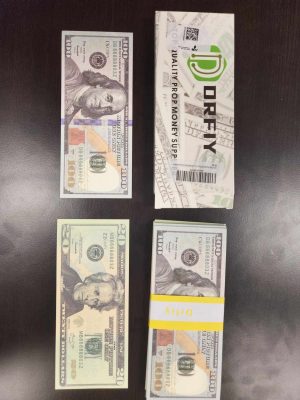Counterfeit and prop money incidents are on the rise in the Jacksonville area. The Jacksonville Police Department dealt with at least two reported cases of “funny money” at two area businesses within the past week alone.
Village of South Jacksonville Police Chief Eric Hansell says that counterfeit $20 bills and $100 bills have been popping up at local convenience stores and at drive-thrus throughout the region for some time, but they have been on the rise within the last year: “Most of what we have been seeing is money that has been stamped ‘For Motion Picture Use.’ Hundreds and twenties are the predominant denominations. Typically, people are passing them at your local gas stations, smaller convenience stores – places where either the employee or the mechanisms in place that check for counterfeit money are not as prevalent. Many times, the suspect is going into these places and providing a couple of $100 bills and having them put on their Cash App on their phone, and then they are absconding from the scene. Later on, the employee is realizing the money was counterfeit or the manager going through the cash deposits is realizing that they have gotten hit for a couple hundred dollars that the business is probably never going to be able to recover.”
Hansell says that if someone is caught with this prop money stamped ‘For Motion Picture Use’ and they are trying to purposefully pass it off as real currency, they can be cited for forgery because they are attempting to cover up the fact that the fake money is not actually U.S. currency: “It is a forgery because you are taking a document, although it’s funny money or motion picture money, they are altering it and obscuring that notification on it to pass it off as real money. They usually try weathering the bill, whether they are putting it through a clothes dryer or washing machine, crumpling it up in their pockets, or marking out or erasing the ‘Motion Picture Use’ notification. They are attempting to make it look like used, real money and presenting it as such, so they are presenting a forged or fictitious document. It sure is taking local businesses to a pretty good tune here and there.”
Hansell says the recent uptick of the fake cash may be attributed to an unnamed local retail location selling the motion picture money as an item on its shelves. Hansell refused to identify the store, but he wants local business owners and the public to be aware it’s in the community. He says at first glance the motion picture money may appear real: “I know it’s an ongoing problem. In the past, the counterfeit bills have been pretty good. Now, this motion picture money, which could have been legally purchased as a prop object in Jacksonville, is now throughout the community being used as counterfeit currency. We are wanting to make sure that local gas stations, employees, and residents know about it in an attempt to deter it from being used as counterfeit cash.”
The Village of South Jacksonville Police Department reported 3 separate cases of the motion picture money being used at local businesses in the month of March. The 3 cases amounted to a total loss of $500.
Hansell says that cash register operators or private citizens who suspect that they have received counterfeit money should remember as much as they can about the transaction, the individual who passed the money, and the time in which it occurred. Hansell says if you suspect that you have been given fake currency, take it to a local bank and have the bank verify the authenticity of the bill, and then, have the local police collect the counterfeit money in an attempt to locate and prosecute the person who perpetrated the crime in an attempt to at least receive some restitution in the case.




